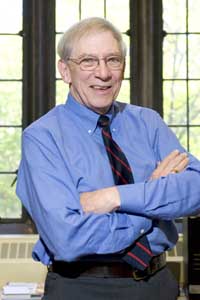Franklin Gamwell, the Shailer Mathews Professor in the Divinity School
By Seth SandersNews Office
 | |
Franklin Gamwell, the Shailer Mathews Professor in the Divinity School, described the mature engagement of students as a distinctive reward of working at Chicago: “One of the joys of teaching at this university and, specifically, the Divinity School, is that the students so quickly become peers, in the sense of independent critics of and contributors to the intellectual projects with which one is engaged.”
Gamwell, who studies ethics and politics in relation to Christian theology and the philosophy of religion, focuses his teaching on 20th-century thinkers, such as Alfred North Whitehead, Iris Murdoch, Paul Tillich and Reinhold Niebuhr, as well as crucial local figures, such as Schubert Ogden, who taught at the Divinity School, and Charles Hartshorne, a Divinity School professor who also was a member of the Department of Philosophy.
Of these, students generally find Niebuhr the most striking. Often, Gamwell said, “People who are interested in religious ethics wish we were like Niebuhr. He uncommonly combined powerful academic work with extensive impact on our public life. On the one hand, he was among the few foremost theologians of the past century; on the other hand he was on the cover of Time magazine. I think what strikes students about Niebuhr is his capacity to think systematically about all the fundamental questions of life and its meaning, and simultaneously to detail the significance of those issues for contemporary social and political problems.”
When asked to propound his teaching philosophy and influences, he offered three characteristics of teachers he has most admired and to whom, he said, “I am most indebted and thus seek to emulate. The first was their capacity to clarify the larger importance of particular questions on which they focus.
“However specialized their own scholarship, those teachers were reflective about the academic enterprise generally, the relation among its specialties and its relation to the larger human community. The second was the capacity to identify and interpret critically the most significant predecessors relevant to the question being addressed. In education, I think, there is simply no substitute for the company of great minds. The third was the capacity to understand and appreciate better than the student her or his own efforts, so that teaching advances the student’s own internal conversation and, therefore, the possibility of her or his distinctive contribution to our common adventure in ideas.”
Gamwell is the author of numerous books, including The Divine Good: Modern Moral Theory and the Necessity of God and Democracy on Purpose: Justice and the Reality of God.
His most recent work is the forthcoming Politics as a Christian Vocation: Faith and Democracy Today, “an attempt to think about the importance of political activity or the exercise of citizenship as an essential aspect of the Christian calling in our time.” His writings have appeared in the Journal of Law and Religion, the Journal of Religion, and the Christian Century. His work also has been published in a number of collections and anthologies, including Introduction to Religious Social Ethics and Religion and Practical Reason.
Gamwell served as an Instructor in Ethics and Society at the Divinity School in 1971. From 1973 until 1975, he was an assistant professor in religious studies at Manhattanville College. In 1975 he began work with the Rockefeller Family Philanthropic Office in New York, where he remained until 1979, when he returned to the faculty of the Divinity School, serving as Dean from 1980 to 1990.
He received his B.A. from Yale University. An ordained Presbyterian minister, he completed his B.D. at Union Theological Seminary and received both his M.A. and Ph.D. degrees from the Divinity School at the University.
![[Chronicle]](/images/sidebar_header_oct06.gif)